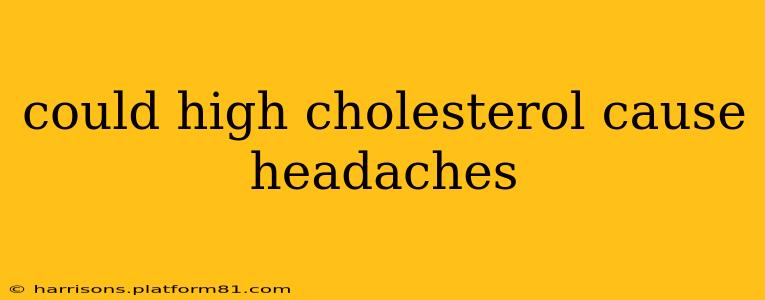High cholesterol itself doesn't directly cause headaches. However, the connection is more nuanced than a simple cause-and-effect relationship. While cholesterol doesn't trigger headaches in the same way as a migraine or tension headache, certain conditions associated with high cholesterol can lead to headaches or headache-like symptoms. Understanding this distinction is crucial.
What is High Cholesterol?
Before we delve into the potential link between high cholesterol and headaches, let's briefly define high cholesterol. High cholesterol refers to a buildup of cholesterol in your blood. Cholesterol is a fatty substance necessary for building healthy cells, but high levels can contribute to the development of atherosclerosis, a condition where plaque builds up in the arteries, narrowing them and restricting blood flow.
Can High Cholesterol Indirectly Lead to Headaches?
The headaches associated with high cholesterol are usually indirect consequences of complications stemming from atherosclerosis. These complications include:
1. Stroke:
-
The Connection: A stroke occurs when blood flow to part of the brain is interrupted. High cholesterol increases the risk of stroke by contributing to atherosclerosis. A stroke can cause severe headaches, often described as the "worst headache of your life."
-
Symptoms: Besides headaches, stroke symptoms can include weakness or numbness on one side of the body, difficulty speaking, vision problems, and dizziness.
-
Importance: If you experience a sudden, severe headache with any of these other symptoms, seek immediate medical attention. This is a medical emergency.
2. Transient Ischemic Attack (TIA) or "Mini-Stroke":
-
The Connection: A TIA is a temporary blockage of blood flow to the brain, often a warning sign of a future stroke. High cholesterol plays a significant role in increasing the risk of TIAs. TIAs can cause headaches, though often less severe than those from a full stroke.
-
Symptoms: Symptoms are similar to a stroke but are temporary, resolving within 24 hours.
-
Importance: While symptoms resolve, a TIA is a serious warning sign requiring immediate medical attention and lifestyle changes to reduce the risk of a future stroke.
3. Hypertension (High Blood Pressure):
-
The Connection: High cholesterol is often associated with high blood pressure. High blood pressure can cause headaches, particularly in the back of the head or neck.
-
Symptoms: Headaches are often accompanied by dizziness, blurred vision, and shortness of breath.
-
Importance: Regular monitoring of blood pressure is crucial. High blood pressure, if left untreated, can lead to severe health complications.
4. Medication Side Effects:
-
The Connection: Some medications used to lower cholesterol, like statins, can have headaches as a side effect. However, this is less common and usually mild.
-
Symptoms: Headaches associated with statins are usually mild and often subside as the body adjusts to the medication.
-
Importance: If you experience persistent or severe headaches while taking cholesterol-lowering medication, consult your doctor.
Do Headaches Mean I Have High Cholesterol?
No, having a headache doesn't automatically mean you have high cholesterol. Headaches have many causes, and high cholesterol is only indirectly linked through its potential complications. A headache should prompt you to consider your overall health, including your cholesterol levels, but it's not a definitive indicator.
When to See a Doctor
If you experience frequent or severe headaches, especially accompanied by other symptoms like dizziness, weakness, vision changes, or severe neck pain, you should consult your doctor. Regular check-ups, including cholesterol screenings, are important for maintaining good health and preventing serious complications.
How to Lower Your Cholesterol
Lifestyle changes are often the first line of defense against high cholesterol. These include a heart-healthy diet rich in fruits, vegetables, and whole grains; regular exercise; maintaining a healthy weight; and limiting alcohol consumption. Your doctor can provide guidance on lifestyle modifications and may also prescribe medication if necessary.
This information is for general knowledge and doesn't constitute medical advice. Always consult with a healthcare professional for any health concerns or before making any decisions related to your health or treatment.
